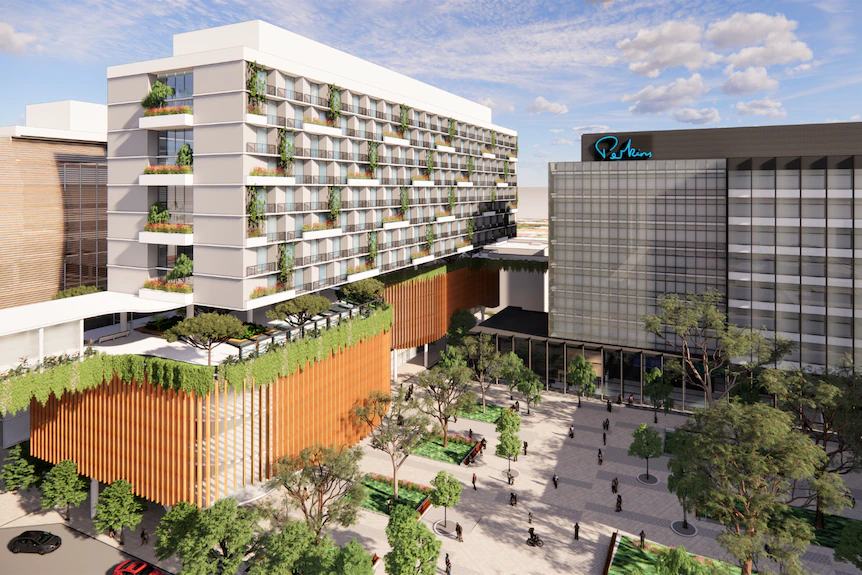
Comment from Professor Peter Leedman, Director of the Harry Perkins Institute of Medical Research regarding news coverage on the WA Comprehensive Cancer Centre
As you know, the Perkins plans to develop a Comprehensive Cancer Centre for WA (WA CCC). The WA CCC will deliver a model of care that is patient-centred, integrated and research-based. Cancer researchers at the Perkins will also be an integral part of the CCC – providing the WA CCC access to the latest research and treatments to deliver exceptional personal care for all patients.
You may have seen recent articles in the West Australian regarding the WA CCC and the upcoming budget on 25 October.
We note that the articles do not say one way or the other what the budget outcome will be. We remain hopeful that funding for construction of the WA CCC will remain in the 25 October budget as a Federal Government commitment.
Thank you so much for supporting the Perkins. We appreciate your commitment to making cancer non-lethal for all West Australians. Your trust in us brings into sharp focus the “why” for a Comprehensive Cancer Centre for WA.
The Benefits of a Comprehensive Cancer Centre in WA
- The Western Australian Comprehensive Cancer Centre (WACCC) will have a model of care that is patient centred.
- Each patient’s case from diagnosis through treatment will be coordinated, shared, and regularly assessed by a multi-disciplinary team.
- Support services will be integrated providing pain management, psychological support, physiotherapy and other holistic care that helps a patient manage treatment better and even stay with it for longer.
- For cancer patients the WACCC will be a truly ‘one-stop-shop’ for all their treatment including intensive care, specialist appointments, imaging and scanning, operating theatres, chemotherapy, radiotherapy, complementary therapy, palliative care and rehabilitation.
- Patient advocates will make and coordinate appointments to reduce patient stress and streamline the journey for patients and their families.
- Tele-health and tele oncology facilities will link the WACCC multi-disciplinary team to a patient’s rural doctor to continue and support their care when they return home ensuring continuity of treatment and assessment
- Imaging and scanning facilities will be located at the WACCC, minimising travel for patients.
- 300 cancer beds, including 110 chemotherapy chairs, intensive care beds, operating theatres, clinical trial beds and a CAR T cell therapy suite will be available to public and private patients.
- Cancer researchers will link research to patient needs enabling personalised cancer care.
- Linear Clinical Research will test and offer trials of the latest cancer drugs and treatments.
- There will be a pharmacy, gymnasium and 350 parking bays.
- The WACCC will be part of a national comprehensive cancer network sharing the latest cancer information, and clinical trial opportunities.
- The WACCC will increase access to a model of care proven to produce better outcomes.
- The WACCC will create hundreds of jobs and help reverse the brain drain of our brightest minds
- CCC’s are widespread in the US, Europe and the UK and are proven to produce better cancer outcomes. Australia has the Peter MacCallum Cancer Centre in Vic and the Chris O’Brien Lifehouse in NSW. All states have plans for CCC’s
Cancer Fast Facts
- Cancer is a leading cause of death by disease in adults and children in Australia
- More than 145,000 Australians were diagnosed with cancer in 2020
- In 2020 nearly 50,000 Australians died from cancer
- Cancer was the leading cause of death for children aged 1–14 between 2015– 2017
- Cancer care in WA is excellent, but often fragmented and not well coordinated
- The demand for cancer services is increasing
- Deaths from cancer are significantly higher in rural and remote areas and in vulnerable populations
“Comprehensive cancer centres use a model of care that is patient centred, integrated, research-based and delivered through multi-disciplinary teams working with co-located services
“For cancer patients to have a truly ‘one-stop-shop’ for all their treatment including intensive care, specialist appointments, imaging and scanning, operating theatres, chemotherapy, radiotherapy, complementary therapy, palliative care and rehabilitation – will be transformative.”
Professor Peter Leedman AO, Director Harry Perkins Institute of Medical Research.
Read the articles from The West Australian
- Explanation needed if cancer centre axed
- Perth cancer centre under major cloud as WA Premier concedes project to cost ‘significantly more’ than $750m
- Perth’s proposed one-stop shop cancer centre in doubt with State and Federal government commitments unclear
